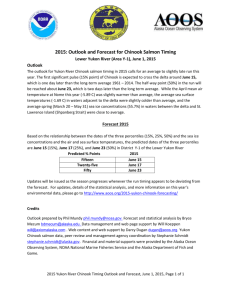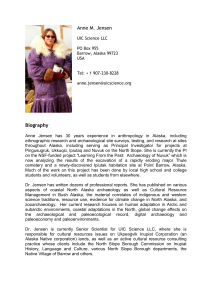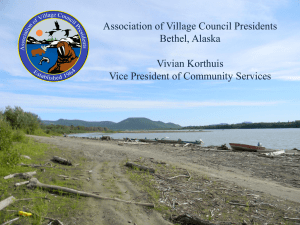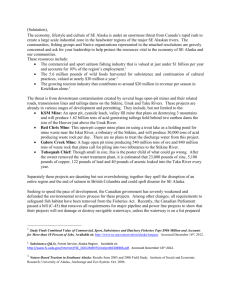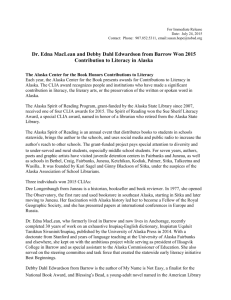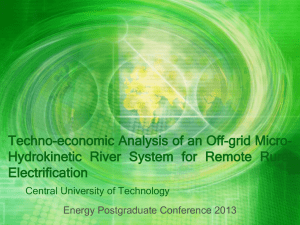Eagle Hydrokinetic Turbine Project
advertisement
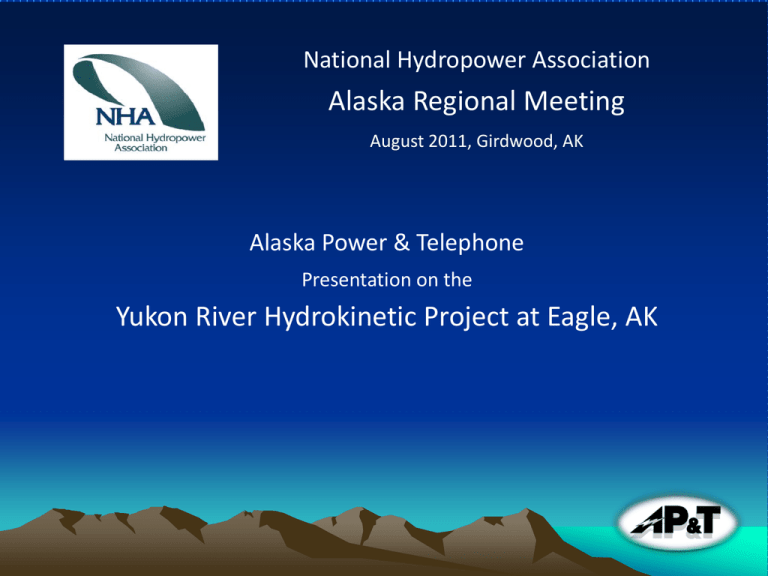
National Hydropower Association Alaska Regional Meeting August 2011, Girdwood, AK Alaska Power & Telephone Presentation on the Yukon River Hydrokinetic Project at Eagle, AK Yukon River Hydrokinetic Project Multi-year project to perform: •Permitting •Studies •Engineering •Manufacturing •Application •Evaluation Permitting •AK DNR •US FWS •USACOE •FERC Studies •Energy •Survey •Potamological •Biological Engineering Manufacturing Application Evaluation •Management •Technical solutions •Deployment/Recovery •Anchoring/Mooring •O&M procedures •Turbine •Barge •Anchors •Power conversion •Support •Construction •Installation •Commissioning •O&M •Monitoring •Performance •Expense Alaska Regional Meeting August 2011 Yukon River Hydrokinetic Project Facts: • Funded by the Denali Commission • $1.6 mil grant awarded in 2007 • $1.5 mil grant awarded in 2010 • • • • • • Administered by the Alaska Center for Energy and Power Installed and commissioned in 2010 Barge mounted New Energy EnCurrent 25kW turbine AC-DC-AC power conversion Output 3Ø, 60Hz power exported to 7200V Eagle distribution system Relocating in 2012 to the ACEP Nenana Test Facility on the Tanana River for further studies Alaska Regional Meeting August 2011 Yukon River Hydrokinetic Project Importance to Alaskans •Potential renewable energy resource •Reduce dependence on costly diesel powered generation facilities •Increase sustainability of smaller Alaskan towns and villages by reducing economic burden of fossil fueled generation •Similar technology to tidal generators •Technical solutions may be applicable to both models Unique factors about the project •One of the first of its kind in Alaska •First of its kind in Alaska to be fully integrated into the local utility grid •First its kind to provide electricity to an isolated Alaskan community Alaska Regional Meeting August 2011 Yukon River Hydrokinetic Project Project Successes •Performance and reliability of the technology •Turbine generator •Barge •Anchor •Deployment and recovery •Power conversion and integration •Control and communication •Power generation, both in: • Parallel mode auto-synchronizing with diesel powered generation system, and • Standalone mode supplying electricity to an isolated section of the Eagle grid. •Potamological studies and surveying performed by TerraSond •Biological studies performed by the University of Alaska – Fairbanks and BioSonics •Cooperation of AP&T with the consultants, technology developers and equipment suppliers Alaska Regional Meeting August 2011 Yukon River Hydrokinetic Project Lessons learned •Technology •Vertical axis cross flow turbine appears to have negligible impact on fish •Careful subsurface power cable routing critical to minimize failures •Number of subsurface mooring lines should be minimized •Turbine performance dramatically effected by river turbulence •Operations •Challenges of working with a powerful force of nature •Challenges of operating the technology in a remote location •Challenges in the logistics of rapidly providing necessary O&M support forces •Maintenance •Challenges associated with periodic debris ‘drift’ on the river •Susceptibility of the equipment to fouling and damage •Difficulty in managing the large submerged and hidden neutrally buoyant objects •Requirement for a large crew to be available to remove heavy accumulations •Maintenance expenses at the site far exceed the value of the modest generation revenue Alaska Regional Meeting August 2011



